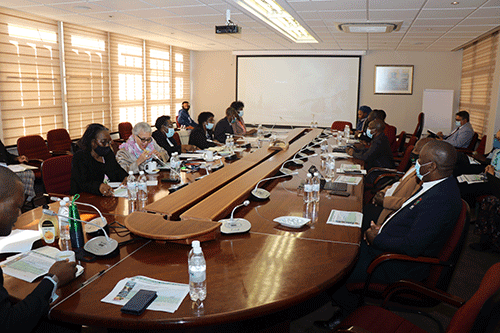George Sanzila
Farmers in the Northern Communal Areas (NCAs) can now breathe a sigh of relief following prospects of a lucrative market for their animals.
This comes after the ministry of agriculture recently sent a team to scout for a market for cattle north of the veterinary cordon fence, also known as the red line. That mission, according to executive director in the ministry Percy Misika, proved to be a successful one as an agreement is expected to be signed soon between Namibia and Ghana, the Democratic Republic of the Congo and Congo-Brazzaville for the selling of cattle from the NCAs. “A team was sent recently to look for a market in those countries. In two weeks’ time, we might be signing an agreement with these countries for the NCAs to export their animals,” enthused Misika.
He was briefing the Parliamentary Standing Committee on Natural Resources last week, which is conducting a series of consultative meetings with different stakeholders falling under its mandate. Misika, who acknowledged the lack of cattle in the communal areas due to the devastation of the recent recurrent drought, assured Members of Parliament of the ministry’s strategies aimed at restocking farmers.
He noted that government has already instituted a task force led by the Meat Board of Namibia. The veterinary cordon fence is an age-old policy dating back to the German colonial period that separates northern Namibia from the central and southern parts of the country with the intention to control infectious diseases among livestock. The rationale behind this approach has been that it has sustained the Namibian meat industry, particularly the exporting of such products to the European Union.
However, critics have slammed the arrangement as limiting communal farmers’ access to domestic, regional and international markets. Namibia currently exports its meat to the European Union and Economic Free Trade Area (EFTA) countries in Europe such as Austria, Belgium, Denmark and others.
Countries such as the United States of America and China have also joined the growing list of Namibia’s export markets. In Africa, South Africa, Angola, Zimbabwe, Zambia and Botswana are likewise part of the market. Misika furthermore revealed that Namibia has secured rights to export its meat to Russia, Egypt and Turkey. Although he bemoaned practices by some communal farmers who take their animals across the borders, therefore putting their animals at risk of infectious diseases such as foot-and-mouth disease, he assured Members of Parliament that Namibia has continued to maintain its good animal health status.
“Namibia has maintained its official disease status as granted by the World Organisation for Animal Health (OIE). We had an outbreak of FMD in September last year, but it is now under control, and restrictions have been lifted. We have challenges with farmers taking their animals to areas that are not vaccinated across the border.
We appeal to you Members of Parliament to help us sensitizse our people,” implored Misika. As part of efforts to improve livestock marketing locally, the executive director noted that the Eenhana, Outapi, Oshakati and Katima Mulilo abattoirs have been renovated, upgraded and handed over to operators. The Rundu abattoir’s construction is nearing completion, as well as the construction of a cold storage and processing facility at Ongwediva.
Water infrastructural development has also improved with 136 boreholes drilled, 112 installed, 278 short pipelines constructed and over 2000 private connections from pipelines laid during the previous financial year. The executive director further briefed the committee on land reform, stating that 10 farms at a total cost of over N$88 million were acquired in the financial year 2020/21, benefiting 20 out of the targeted 26 people.
Over 7 000 customary land rights were also registered. Amongst the challenges mentioned by Misika which the ministry is grappling with include limited financial resources that threaten the current operations of the ministry to contain the migratory locust outbreak that has devastated large swathes of agricultural land, and ageing water infrastructure.
The committee, which is chaired by Tjekero Tweya, comprises fellow MPs Gotthard Kasuto, Paula Kooper, Maria Elago, Lucia Witbooi, Herlinde Tjiveze, Fenni Nanyeni, Sebastian Karupu, Johanna Kandjimi, Vincent Mareka, Kletus Karondo, Natangue Ithete, Tangeni Iijambo, Erastus Shuumbwa, Agnes Kafula, Gorthard Kandume and Jerry Ekandjo.


